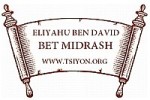Need to talk to us? - In the USA and Canada just call us toll free at (888) 230-2440 for help. Internationally, email us and we will arrange a phone or Skype call for you.
From
Eliyahu
What a difference a few days can make! As we started this month the geopolitical situation in the middle east seemed to be about the same as it has been for a while. Now, over just the last ten days or so, middle east borders are quickly being redrawn by a "new" group of Islamic extremists called ISIL/ISIS to make room for their new Islamic caliphate.
This happened so fast it caught many off guard. Not us here at Tsiyon, though. Since 2008 we have been saying that major changes would be coming to the middle east chessboard in 2014 and 2015. This was underscored this last Passover with the first of the tetrad blood moons which are a sign of momentous middle east bloodshed associated with this time frame, which we also told you about years in advance. What we've got here, for those who may not know yet, is a growing Sunni / Shiite war for middle east Islamic dominance. The prime movers in this war are the Saudis on the Sunni side and the Iranians on the Shiite side. Meanwhile, the New World Order is mostly happy to step back to let this Islamic war rage on, to dissipate the resistance of the Islamic world.
This Sunni/Shiite war may seem like a good thing for Israel, since it is keeping the Islamic extremists on both sides busy killing each other instead of killing Jews. While that's true for now, it is not likely to continue in this mode indefinitely. That can be seen from the name of the new Sunni group that has been having so much success of late. The news media seems to have settled on "ISIS" as the name of the group. This name, we have often been told by the main-line media, is Islamic State of Iraq and Syria. This interpretation of the name is incorrect by design. It gives the reassuring impression that only Iraq and Syria are in the crosshairs, which helps to pacify the American public. In actuality, the true name of the group is better represented as ISIL. Here is why:
“In Arabic, the group is known as Al-Dawla Al-Islamiya fi al-Iraq wa al-Sham, or the Islamic State of Iraq and al-Sham. The term ‘al-Sham’ refers to a region stretching from southern Turkey through Syria to Egypt, also including Lebanon, Israel, the Palestinian territories and Jordan. The group’s stated goal is to restore an Islamic state, or caliphate, in this entire area. The standard English term for this broad territory is ‘the Levant.’ Therefore, AP’s translation of the group’s name is the Islamic State of Iraq and the Levant, or ISIL,” says Tom Kent, AP standards editor.
The true name of ISIL pretty much tells you where all of this is going. Israel IS in the crosshairs - ISIL just hasn't gotten that far yet! It's going to get worse before it gets better, so stay tuned.
On another note, our latest Midrash is out. You will hear me talking about things on this program I've never spoken publicly about before. I said I would cover everything as we make our way through the Torah, and I'm definitely keeping my promise with this. Tune in and let me know what you think.
Blessings and Shalom!
Eliyahu ben David
www.tsiyon.org
________________________________________________________
Comments from Listeners
Listener Comment - Does Cooking Meat Make Me Unclean? I am confused about Leviticus 11:39. It says: “‘If any animal, of which you may eat, dies; he who touches its carcass shall be unclean until the evening." Would that mean if I cook a chicken and eat it, even if the meat itself is clean, I am unclean because it is dead and I touched its carcass? If so, I prepare meat daily so would be unclean most of the time.
Tsiyon Response - Does Cooking Meat Make Me Unclean? Thanks for asking such a relevant question that others have wondered about as well. The verse you mention assumes that the animal "dies" - that is, it has died on its own apart from being properly killed, bled and prepared for use as food. Strong's Hebrew Dictionary offers this definition of the Hebrew word here translated as "carcass": nebelah "..(beast) that (which) dieth of itself." This would not rightly apply to meat properly killed, bled and prepared for food, so this verse does not say a person is "unclean" who has properly prepared a chicken for supper. Of course, cleanliness is always important when preparing food, but that aspect is not in view here.
Listener Comment - Did it ever rain on the Temple mount? Did it ever rain on the Temple mount? I often wonder if rain would affect the fire on the altar?
Tsiyon Response -
Did
it ever rain on the Temple mount?
As you
know, YHWH insisted that the fire on the altar,
which He first kindled, should never be allowed to
go out. No doubt, that's why you have wondered if
rain may have extinguished the fire at some point
during the many centuries in which the
Tabernacle/Temple sacrificial system was in
operation. (Lev 6:12+13, 9:24) "Ten miracles were performed for our fathers in the
Temple: (1) A woman never miscarried because of the
aroma of the sacrificial meat. (2) Sacrificial meat
never became spoiled. (3) A fly was never seen in
the slaughter house. (4) The High Priest never had a
seminal emission on Yom Kippur. (5) Rain never
extinguished the fire of the arranged wood [on the
Altar]. (6) Wind never prevailed over the pillar of
smoke [that rose from the Altar]. (7) The Omer
offering, the Two Loaves, and the Show-bread were
never found to be invalid. (8) [The supplicants at
the Temple] would stand crowded together but would
bow with ample space. (9) A snake or scorpion never
did harm in Jerusalem. (10) A person never said to
his fellow, 'It is too crowded for me to lodge
overnight in Jerusalem.'" [Mishnah Pirkei Avot 5:8]
While this may sound like mythology to many, it may
very well be true, since we can be sure that YHWH
always keeps His side of the Covenant.
Listener Comment -
Making beef sausages with kielev
fat:
Thank you for the wonderful weekly messages they're
a huge source of blessing during Shabbats. :) My
question: I make home made beef sausages and often
all fat, including kielev, is used in making a
sausage. It seems from the lessons #71 and #74 that
the fat restriction is for cattle intended to be
offered as sacrifice and not cattle for every day
eating? Did I understand this right? Can you eat all
the fat of cattle if its not an animal intended for
sacrifice?
Tsiyon
Response -
Making beef sausages with kielev
fat:
I'm pleased you are being blessed on Shabbat by our
Midrash messages. Thanks for your question about the
use of kielev fat in making beef sausages. As you
may be aware, rabbinical Judaism does not allow
kielev fat as part of a kosher diet. While I feel
comfortable eating kosher food, I personally do not
agree with the rabbinic interpretation in some
aspects of kosher. For example, I feel they take the
command not to 'boil a kid in its mother's milk' to
an extreme when they disallow all beef and cheese
from being eaten together. I have no Biblical
problem with eating a cheeseburger, all though I
might not do it while visiting Israel so as not to
unnecessarily offend. Your question about the kielev
fat may be a similar issue. Since animals are no
longer being offered for sacrifice it could be
reasonably argued that this statute is not presently
in force. Aside from that there may be health issues
involved with this particular fat, but if so, I have
no definitive information about that. If you choose
to use the kielev for sausage at this point in time
I have no persuasive argument against it. My only
caution is to let possible kosher eaters know in
advance about this choice before serving it to them,
in case they aren't comfortable departing from the
stricter rabbinical kosher standard. I hope that
helps.
There is no record in scripture of rain ever
extinguishing the fire on the altar. Jewish sources
list this as one of ten miracles associated with the
Temple over its long life, as follows:







